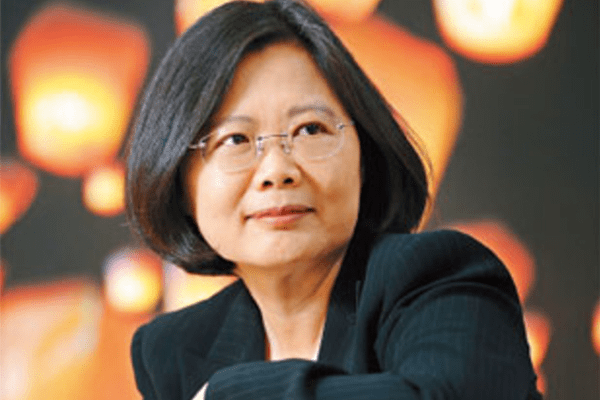Tsai Ing-Wen Approval, Education, Political Career, DPP Political, Positions, Advocacy and Family Life

| Birth Name: | Tsai Ing-Wen |
|---|---|
| Date of Birth: | 31/08/1956 |
| Age: | 69 years old |
| Nationality: | Taiwanese |
The President of Taiwan Tsai Ing-wen approval ranking hit massive number even though she had no experience of serving in executive position previously.
Tsai Ing-wen is the second president from the Democratic Progressive Party (DPP). The first president from both Hakka and aboriginal descent had never served in executive president previously. She neither had held the Mayor position. However, Tsai Ing-wen approval topped surprisingly which makes her a popular president. Tsai serves as Chairperson of DPP after serving as party chair for four years. After losing Mayoral election in November 2010, she ran for presidential election which she subsequently won in 2016.
Tsai Ing-wen was born on August 31, 1956 in Zhongshan District, Taipei, Taiwan as the youngest among 11 children. She attended Taiepei Municipal Zhongshan Girls High School. Due to her father’s request, she studied law at National Taiwan University. After graduating in 1978, she went to Cornell University for Masters of Law in 1980. Tsai did her PhD in law from the London School of Economics in 1984.
Upon completion of study, Tsai returned to Taiwan and taught at the Soochow University and National Chengchi University. Soon after, Fair Trade Commission and Copyright Commission appointed her. After appointment, Tsai served as a consultant for the Mainland Affairs Council and the National Security Council. One of the major responsibilities she held was to lead drafting team of the Statute Governing Relations with neighboring country Hong Kong and Macau.
Early Political Career Highlights
Tsai Ing-wen approval ranking was high in 2000 due to which she became chairman of the Mainland Affairs Council. As the chairman, she maintained Pan-Green sympathies. In 2004, she joined the Democratic Progressive Party (DPP). Eventually, she became legislator-at-large after 2004 legislative election. She earned reputation in 2006 becoming vice president of the Executive Yuan. Meanwhile, she got the responsibility as chairwoman of the Consumer Protection Commission.
In 2007, Tsai resigned making way for incoming Premier Chang Chun-hsiung and his cabinet. After this, Tsai served as chair of biotech company TaiMedBiologics. While Tsai was preparing to enter corporate world shifting from politics, Kuomintang candidate Ma Ying-jeou suggested her to run for 2008 ROC presidential election. In 2008, Tsai defeated Koo Kwang-ming in DPP chairperson election and became the 12h chairperson of DPP.
First Term DPP Chairperson (2008-2012)
Tsai Ing-wen approval as DPP chairperson got final as she took over the office in May 2008. The same year, Ma Ying-jeou became the president. As the chairperson, she stated that DPP would work to defend justice in addition to deepen Taiwanese localization. She, however, criticized Ma for talking about closer Cross-Strait relationship with but not talking about Taiwan’s security and sovereignty. At the same time, Ma called Tsai a Taiwan independence extremist.
Tsai apologized for former president Chen Shui-bian’s deed of transferring campaign funds overseas. However, Tsai stated that the party would not cover up Chen’s alleged mistakes. Therefore, there was establishment of Clean Government Commission to investigate DPP regarding corruption.
In 2010, Ma and Tsai had a television debate over proposed trade deal with China. While Ma said export of Taiwanese goods to China would lower unemployment rates, Tsai believed Taiwan would be Chinese parasite. It was under Tsai’s leadership DPP started gaining momentum in election. Therefore, Tsai Ing-wen approval ranking as chairperson of DPP in 2010 was high enough.
In 2012, Tsai resigned from her position as chairman of DPP after losing 2012 presidential election bid to Ma Ying-jeou.
Second Term DPP Chairperson (2014-present)
In the beginning of 2014, Tsai announced her plan to run for party chief of DPP. But her opponents Su Tseng-chang and Frank Hssieh dropped out in the aftermath of Sunflower Student Movement. As a result, she defeated Kaohsiung County deputy commissioner Kuo Tai-lin by huge margin.
She led DPP to historic victory in local elections due to which the party secured leadership of 13 out of 22 municipalities and counties. As a result, Tsai held strong position in the party and secured front-runner in 2016 Presidential Elections. Tsai Ing-wen approval ranking was high to win the presidency on February 2015 beating Eric Chu.
Political Positions and Advocacy
She is the strong supporter of Taiwan and US relationship. In December 2016, she held telephone call with President Donald Trump. It was the first time ROC president held telephone conversation with the US president after 1979.
Tsai understands the significance of economic and trade relation with mainland China; however, she spoke against the ECFA. Economic Cooperation Framework Agreement (ECFA) is trade agreement that raised economic links between Taiwan and mainland China. The president is actually supporter of the trade diversification of Taiwan.
Similarly, Tsai bestows her support to disadvantaged groups in society like poor, women, children, aboriginals and LGBT groups. She supports government action to reduce unemployment. Instead, Tsai introduced entrepreneurship incentives among youth, expanded public housing and childcare support. The development oriented president Tsai Ing-wen approval in her position rose because of her belief in transparency and disciplined fiscal management.
Regarding politics, Tsai supports non-partisanship of the president. She supports increase in number of seats in legislature. She welcomes participation from all political parties and interest groups. Likewise, she supports repairing the damage aboriginals went through. Her actions include calling for de-polarization of Taiwanese politics and advocacy for open consensus-based approach to addressing issues and passing law.
Tsai is the supporter of LGBT rights and has endorsed same-sex marriage. She has used her social site and campaign videos to support them.
Her paternal grandfather come from a renowned family in Fangshan, Pingtung and has Hakka descent. Comparatively, her grandmother from Shizi, Pingtung has aboriginal Paiwan descent. Tsai’s mother, Chang Chin-fong, is the last out of four mistresses of her father, Tsai Chieh-sheng. Tsai has three full siblings, is unmarried and has no children.
Tsai Ing-wen approval ranking as president got stronger with her people-centric efforts. One of the world’s most powerful women, Tsai Ing-wen net worth is unknown. However, her individual uprising in politics without any political background is amazing.
Recent News
-

Duane Chapman Is Now Engaged To Girlfriend Francie Frane, Had Lost Wife 10 Months Earlier
-

Katherine Schwarzenegger Pregnant With Her First Child With Husband Chris Pratt
-

Chris Cuomo's Son Mario Tested Postive For Coronavirus
-

Kodak Black And NBA YoungBoy, Dissing One Another Via Social Media
-

Maeve Kennedy McKean, Robert F. Kennedy's Granddaughter, is Missing Along With Her Son
Entertainment
-

The Evolution of Entertainment: Online Casting Calls Redefining the Industry
-

Mamoudou Athie's Must-Watch Performances in the Movies and TV Series
-

Try These Unique Forms of Entertainment When You've Exhausted All Options
-

7 Best Movies on Netflix This Week
-

Campus Grooves: Exploring Music Festivals in American Colleges





